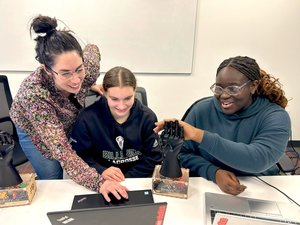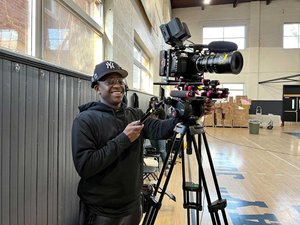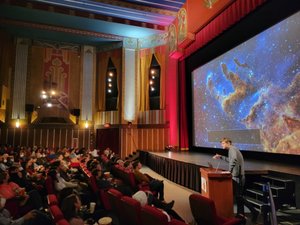The end of 2016 is nigh, which means it's time to look back at what we saw as the year's biggest stories in Boston's tech community. This doesn't necessarily mean that they were the most-read stories on our website. Instead, the stories listed here ended up having an outsized impact on the local community or the world.
Take, for instance, the United Parcel Service deciding to conduct its first drone delivery test in Massachusetts using drone technology created by CyPhy Works, the Danver-based startup founded by iRobot co-founder Helen Greiner. On the negative side, there's the failure of Massachusetts lawmakers to reach a compromise on noncompete reform, meaning that many tech employees would continue to be barred from moving on to new ventures at the pace they should be allowed to. And, of course, the list wouldn't be complete without the news of General Electric choosing Boston as the location of its new headquarters.
Without further ado, here are the biggest Boston tech stories of 2016:
GE announces it will relocate HQ to Boston
Easily the biggest Boston tech news of the year happened right at the beginning of 2016 when General Electric announced it would relocate its headquarters from Fairfield, Connecticut to Boston, where it will have 800 employees by the time the full move is completed in 2018. Not everyone has been a fan of GE gaining more influence in Boston, but Boston Mayor Marty Walsh and Gov. Charlie Baker worked together and fought hard to help Boston beat other cities on GE’s short list, which also included New York and Providence. GE’s move is thought to be a win for the Boston tech industry, with GE Ventures already having invested in at least seven Boston-area companies and GE’s major plans to become part of the innovation ecosystem.
Massachusetts lawmakers fail to pass noncompete reform
Many of us thought 2016 would be the year Massachusetts lawmakers would be able to end, or at least severely limit, noncompete agreements that prevent employees from working at another employer for a set amount of time. The Boston tech and venture capital community was hoping noncompetes would be defeated or weakened because it would allow new startups to form and grow more seamlessly, but the state Senate and House of Representatives were unable to reach a compromise between their respective versions of a noncompete reform bill. However, while noncompetes will still continue to limit the state's innovation economy, the more egregious issue is that employers will still be able to enforce noncompetes for interns, people under 18, most hourly workers and people who get fired or laid off. Lawmakers may attempt to pass noncompete reform again in 2017.
Boston begins testing self-driving cars
Boston is finally working on becoming the next hub for autonomous vehicles. After Cambridge self-driving car startup nuTonomy became the first company to start testing self-driving taxis, in Singapore, while Uber began testing its own autonomous fleet in Pittsburgh, the city of Boston announced a self-driving car initiative it’s working on with the World Economic Forum to create policy recommendations and begin autonomous vehicle tests. NuTonomy has since announced that it’s expected to start conducting self-driving car tests on a private plot of land in Boston’s Seaport before the end of this year.
Forbes Under 30 Summit comes to Boston
Another boost for Boston’s entrepreneurial community happened when Forbes announced it was holding its Under 30 Summit in Boston this year. As Forbes Editor Randall Lane wrote, the magazine chose Boston over the rest of the country for its large millennial audience, a high concentration of college students and a bustling startup scene. During the event’s festivities, Pillar Technologies, a startup out of Wentworth Institute of Technology, won an investment from Sound Ventures, the firm run by Ashton Kutcher and Guy Oseary.
Salesforce acquires Demandware
Being public isn’t as cool as it used to be, at least for some tech companies. Demandware, a Burlington-based ecommerce software company, decided it was better in the hands of West Coast CRM software giant Salesforce earlier this year. Salesforce agreed to pay $2.8 billion to acquire Demandware, which has since been rebranded into Salesforce’s Commerce Cloud solution. And instead of shrinking, Demandware is set to grow with new hires and an expanding office footprint in the coming years.
Cyber attack on Dyn brings internet to a crawl
The internet came to a crawl for millions of people in October when a massive cyber attack struck Dyn, a New Hampshire-based provider of DNS services that help domain names resolve into IP addresses. The attack, which brought down major sites like Twitter, Reddit and Airbnb, was an important reminder of how prevalent cyber attacks are becoming and how hackers are able to create large botnet armies by hacking into vulnerable and cheap internet devices that have become household appliances. Unrelated to the attack, Oracle would go on to acquire Dyn for over $600 million, according to a few reports.
Dell completes acquisition of EMC
Some thought the multi-billion dollar deal wouldn’t come together, but Dell’s acquisition of Hopkinton-based storage giant EMC finally closed in September, almost a year after the deal was initially announced. Together, the combined company is now doubled in size with a $30 billion business, though it is expected to have some layoffs — at least 2,000, according to some reports. Dell founder and CEO Michael Dell hasn’t really made his presence known in Boston, but that could change soon. For starters, Michael Dell bought an 11 million dollar condo in Boston’s Millenium Tower, which he’s expected to hold as a part-time residence.
Diane Hessan leaves Startup Institute to work for Hillary Clinton
One of the most influential tech leaders in Boston decided to leave her post as CEO of Startup Institute and follow her passion of this year's presidential election. An announcement which turned so many heads over the summer. She remained silent for months about a secret project she was working on and eventually revealed in November that she was on special assignment for Hillary Clinton’s campaign to study, analyze and help strategize on 'undecided' voters throughout the election.
DraftKings and FanDuel finally confirm their merger plans
After several months of rumors and speculation, Boston-based DraftKings finally confirmed its plans in mid-November to merge with its New York-based longtime competitor, FanDuel. With Donald Trump becoming president in January, it’s unclear if the merger will face any regulatory challenges, but for some industry observers, this merger has been a long time coming. While the two companies have spent significant resources contending for many of the same consumers, they slowly became allies as they face regulatory and legal battles together across the country over the past year.
Liberty Mutual gets into the startup world in a big way
Liberty Mutual, a major local insurance provider, made a few major announcements that would have an impact on the startup world. For one, it launched a startup incubator in January called Solaria Labs and then, a few months later, it announced the launch of a new $150 million venture capital fund. It ended up having a major hand (and a few million dollars) in the launch of a new home service provider startup called All Set, which turned out to be one of the first ventures launched out of Solaria Labs.
Dan Lyons' "Disrupted" book disrupts HubSpot
With the swift departures of two executives from HubSpot last year, Dan Lyon’s now-released book, “Disrupted: My Misadventure in the Start-Up Bubble,” was easily one of the biggest local tech stories of 2016. With the release of the book in April this year, Lyons and “Disrupted” hit the local spotlight again, using his time as a former employee at HubSpot to illustrate what he thinks is wrong with the modern tech industry. HubSpot co-founders Dharmesh Shah and Brian Halligan wrote a rather “non-response” response after reading the book, easily letting Lyons ultimately win the PR war he started.
LogMeIn announces merger with Citrix's GoTo business
LogMeIn is set to become a much larger entity after announcing in July that it plans to merge with Citrix’s GoTo business in a tax-free deal valued at $1.8 billion. LogMeIn CEO and President Bill Wagner is set to lead the combined company, which will be headquartered in Boston. The merger, which has already received U.S. regulatory approval, is expected to triple the size of LogMein’s business to over $1 billion in annual revenue and nearly 3,000 employees.
Two Massachusetts tech companies go public
While there are still a few days left in 2016, it’s safe to say the year will end with only two Massachusetts tech companies filing for their initial public offering and going public. Those companies are Everbridge, a Burlington-based provider of emergency communications software, and Acacia Communications, a Maynard-based network technology company. It’s a small increase from the one Massachusetts tech IPO that happened in 2015 (Rapid7), which was a major drop from the four local tech IPOs that happened the previous year (Care.com, HubSpot, Wayfair and Imprivata). However, there remain a number of local IPO candidates, including Carbon Black, Actifio, Acquia and Everquote.
A few new VC firms launch in Boston
Maybe the stars were aligned, but for whatever reason, 2016 saw the launch of a few new venture capital firms in the Boston area. We already told you about Liberty Mutual Strategic Ventures, which raised a $150 million fund, but that doesn’t even cover the non-corporate VC firms that got their start this year. That includes Underscore.VC, the new firm led by Michael Skok, C.A. Webb and John Pearce; Pillar, the new firm started by Jamie Goldstein with the help of several local tech CEOs; and Glasswing Ventures, the new firm started by Rudina Seseri, Sarah Fay and Rick Grinnell. Jon Karlen, a former partner at Cambridge VC firm Accomplice, also started a new firm called Astral Capital, though there are still few details available.
Alphabet looks to sell Boston Dynamics
Boston Dynamics, the Waltham-based robotics company that produces those weird robot videos on occasion, has reportedly been up for sale by its parent company, Alphabet. However, there has been mostly radio silence since reports emerged in March of Google’s parent company looking to sell Boston Dynamics. According to a Bloomberg report, Alphabet executives had been unhappy with Boston Dyanmics’ progress in bringing its robots to a point of commercialization.
USP conducts first drone delivery test in Massachusetts
Earlier this year, the United Parcel Service made history for Massachusetts when it conducted its first drone delivery test in a small island off Beverly, Mass., using a drone made by CyPhy Works, the Danvers-based startup founded by iRobot co-founder Helen Greiner.








